A Year Abroad in Nice, France on a Full Scholarship
A Transformational Experience in a Beautiful Location
Article and photos by Sarena Tien
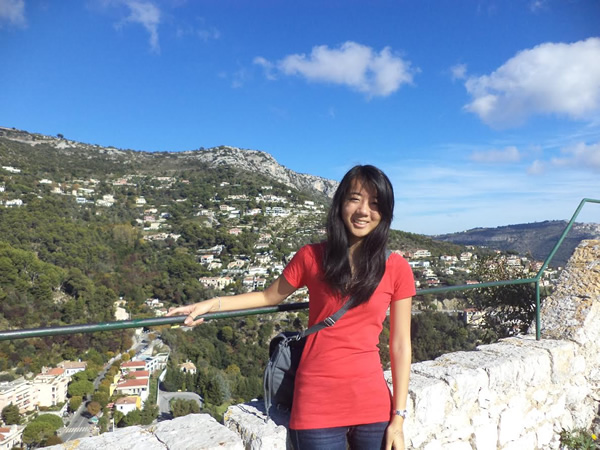
|
|
The author in a garden in Èze, a spectacular ancient town near Nice.
|
In sixth grade, my English teacher told me that being painfully shy would hurt me later in life. I wonder what she’d think of me after I left my tiny college of 1,400 students to study abroad in Nice, France, for a year.
“How was France?” inevitably became the most popular question when I returned home. I didn’t know how to summarize my year abroad, so I said, “It was nice.” And then I realized that, after all the pun-related comments about Nice and nice, that I needed to find another response.
To this day, I still don’t know how to answer that question. Should I talk about my classes, travels, or personal growth?
Because it’s funny, really, that my teacher thought my shyness would hurt me. In the end, it helped me. Before I studied abroad, I hated interacting with people and used my more extroverted friends as mouthpieces.
But my past left me room to grow. In France, I learned that strangers had fascinating stories to tell. I had no one to hide behind when I tripped over my American-accented French. So, when I returned to America, I discovered something within myself that I hadn’t known existed: confidence. After being on my own for eight months, I realized that speaking in my native language presented no issues.
Who knew that studying abroad could make you more confident?
Why Go Abroad?
As a French major, I constantly seek ways to improve my French. Despite reading textbooks and listening to music, I knew several hours of French class a week wouldn’t bring me to the level of fluency I wanted. However, my motivations weren’t entirely academic. Having been born and raised in a suburban neighborhood, a part of me felt stifled. I wanted out. I wanted to become independent, explore the world, and learn more about myself.
Studying abroad achieved those goals in many ways: I cooked my own meals, traveled alone, interacted with natives, gained self-confidence, and improved my interpersonal and language skills. Everyone’s experiences and goals will differ, so don’t expect the same results.
Choosing Nice
My heart was set on France. Slowly, painfully, I narrowed my choices to Nice and Le Mans. Did I want a large city sprawled between the Mediterranean and the Alps or a small town along the Sarthe River? Nice looked ridiculously gorgeous and was conveniently near the French-Italian border. Still, Le Mans was closer to Paris and possessed a small-town feel that would make me more comfortable. My school in the U.S., Randolph-Macon College, is in a tiny town with a population that doesn’t even touch 8,000.
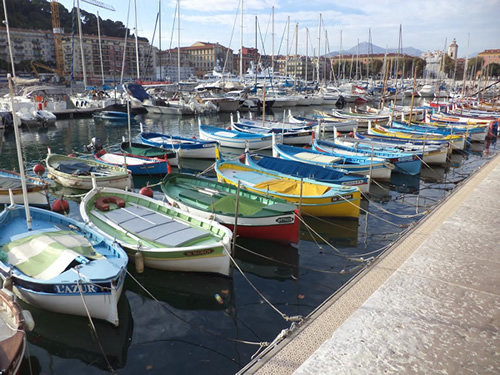
|
|
The port of Nice.
|
The Office of International Education at R-MC readily offered advice and suggested that I explore the ISEP website. However, financial reasons and an endowed scholarship convinced me to choose Nice and its rich cultural offerings. The Georgina Childs and Marcel Prat de Jouvenal scholarship paid for my entire experience from September to May, including airfare, tuition, and living expenses.
Scholarships, Grants, and Resources to Study in France
Studying abroad doesn’t have to drain your college funds. My situation was unique, but there are plenty of financial aid options available for studying in France:
If none of these suit you, don’t fret! Ask your school’s study abroad advisor.
|
Once accepted into a study abroad program, the slew of paperwork commences. If you study at an American institution, you must obtain your visa through Campus France. I wish someone had warned me how meticulous the process would be, although ISEP has a helpful guide. At the D.C. Consulate, I paid just $68 for a long-stay visa, which allows you to travel all over the Schengen area.
When you arrive in France as a student, you must pay 213 euros for sécurité sociale health insurance. If you’re staying for a year, you must OFII immigration fees and get a medical checkup.
Adapting and Adjusting
Getting over jetlag is the easy part. You only have to do it once. Adjusting to cultural and educational differences is hard because all you can do is adapt. But it doesn’t take long to familiarize yourself with a city and eventually call it home. Before you know it, you’ll determine the quickest routes to class, the best places for lunch, and the tastiest gelato shops.
I strongly recommend keeping a journal, a blog, or both so you won’t have to repeatedly tell everyone what you’re doing. I had two blogs, an official one that chronicled my realizations and travels and a personal one that recorded my thoughts and day-to-day occurrences. You’ll thank yourself when you get back home because as much as you want to think that your memory is perfect, the lesser moments will slip from your mind. Having a cashier tell you, “Tu as un bel accent!” (“You have a pretty accent!”) is just as important as stepping foot into the Coliseum during spring break.
Getting to Know the City
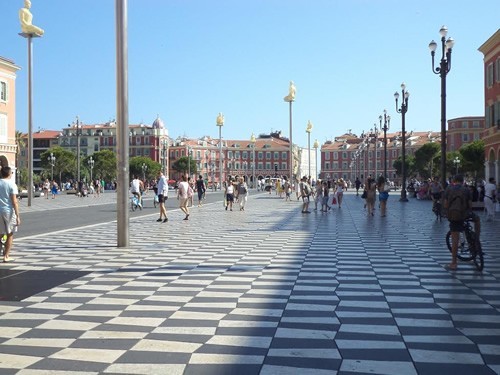
|
|
Nice's famed Place Massena.
|
No matter where you study, you’ll find many places to explore with your friends. Despite its compact, red-roofed, ocher-shaded buildings, Nice is rife with activities for the confused tourist or excited student — museums, churches, landmarks, marketplaces, and winter sports. Get lost. I’ve found that it’s the best way to fall in love with a city and its hidden nooks, crannies, and alleyways. If you can’t find your way out, consult a map or politely ask a local.
Transportation
A year-long bus pass with the Lignes d’Azur costs 150 euros and includes infinite trips on Nice’s trams and buses. You can even use it to travel to nearby towns and cities such as Menton, Èze, and Saint-Paul-de-Vence.
The only inconvenience is when bus workers go on strike — you must rely on walking or biking.
The Vélo Bleu is very convenient; you can purchase daily, weekly, monthly, or yearly passes at numerous stations scattered throughout the city. Even the comfortable SNCF French trains are affordable: an eighty-minute roundtrip ride to nearby Ventimiglia, Italy, costs a mere 11.40 euros.
Accommodation
I lived in a tiny 9m2 room in the Baie des Anges residence with a private bathroom and communal kitchen. It was right behind the main academic building of Campus Carlone.
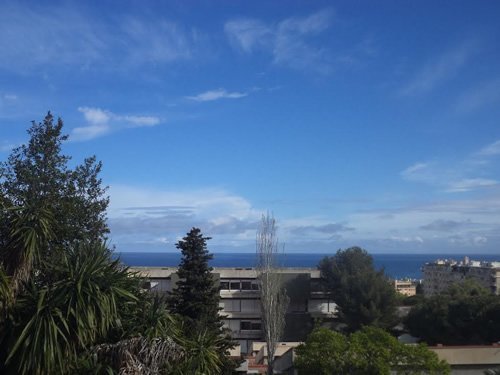
|
|
The view from my dorm window.
|
As convenient as this was for going to class in the mornings, it took twenty minutes to reach the city center by bus. Apartments are an alternative; despite pricey rental rates, you can find roommates who will split the rent. Homestay is the most expensive option, although you enjoy home-cooked meals and will converse in French with a local family.
Social Media
Some people advocate for Facebook abstinence. I’m staunchly against that. Use Facebook. Unless you’re a robot, sometimes you’re going to be homesick. And unlike texting, it’s free, so it’s a suitable medium for making plans with your newly acquired international friends.
Cultural Differences
The list is endless for any country, though I’ll mention the ones that stood out the most to me. At grocery stores like Casino, Leader Price, Carrefour, and Monoprix, you don’t get plastic bags for free — you have to buy them or bring your own bags. Dogs follow their owners into supermarkets and onto buses; people smoke a lot more; A.C. isn’t omnipresent; peanut butter is a rarity; and public toilets are neither ubiquitous nor free.
(Advice for Americans of color: nothing changes when studying abroad in any predominantly white country. After you tell people you’re from the U.S., they’ll still want to know your “country of origin.” As a Chinese-American, I’m speaking from experience.)
Educational Differences
I admit that spending two years at a small, private liberal arts college spoiled me. I was used to a beautiful campus, comfortable chairs, and top-notch technology. But Campus Carlone of the Université Nice Sophia-Antipolis didn’t offer such relative luxuries. The Faculté des Lettres, Arts et Sciences Humaines comprises a main building, an extension building, a library, a dorm, and a university restaurant. The chairs are all wooden. Classrooms don’t have A/C, heat, computers, or Promethean boards. All essays and exams are written by hand.
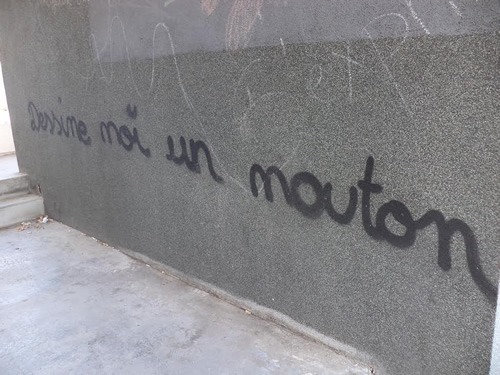
|
|
The Little Prince graffiti along an outside staircase of the university.
|
I studied French through the CUEFLE (Centre Universitaire d’Etudes en Français Langue Etrangère) program, which aims to teach international students French as a foreign language. Classes include reading, writing, listening, speaking, literature, and culture. They range from one to five hours in length and occur once a week. Homework is nonexistent, and on the off chance that it’s assigned, it typically consists of a worksheet or two. The only grades you get are midterms and finals. Essays were the worst for me, 5-paragraph opinion essays with strict word counts that slowly killed my inner writing tutor.
At the end of the semester, if you get a 150/300 or higher, you obtain your DUEF diploma (Diplômes Universitaires d’Etudes de Langue Française) for levels A2, B1, B2, C1, or C2. The DUEF is a French national degree that attests to your level of proficiency in French. One semester is worth 30 ECTS (European Credit Transfer and Accumulation System). Since each ECTS is worth half of an American credit, you’ll acquire at minimum 30 credits by the end of the year, 15 if you choose to stay for a semester.
Expectations vs. Reality
I thought I’d be able to soak up fluency in French like the Mediterranean sun, but I just developed a tan. Mastery of a foreign language isn’t a skill that you can necessarily pick up during eight months of immersion. Yet, my proficiency certainly improved, and it’s possible to begin thinking in a foreign language.
If you think that going abroad will give you some grand insight into what you want to do with your life and for your major, don’t be disappointed if it doesn’t. The idea of knowing what you want to do for the rest of your life when you’re only in college doesn’t apply to everyone. The important thing is that you can explore your opportunities and develop invaluable skills such as independence, observation, flexibility, and cultural awareness.
Finally, back home, know that life has moved on without you — whether you like it or not. You’ll feel like a stranger in your skin, trying to fit into an old yet unfamiliar environment. I’ve found that the following quote best conveys the sensation of reverse culture shock: “It’s a funny thing coming home. Nothing changes. Everything looks the same, feels the same, even smells the same. You realize what’s changed is you.” It’s up to you to figure out what you want to do with your new self.
A hopeful trilingualist who spent her junior year abroad in Nice, France, Sarena Tien attended Randolph-Macon College in 2016. When she's not reading, scribbling in notebooks, or typing away on her laptop, she can often be seen folding far too many origami stars.
|
